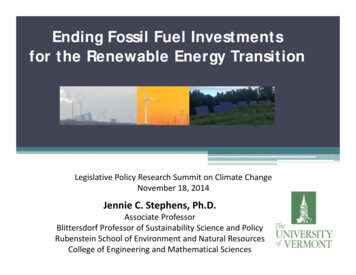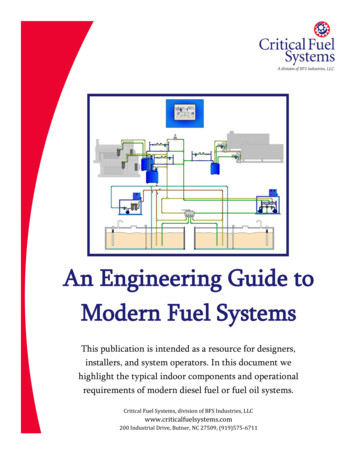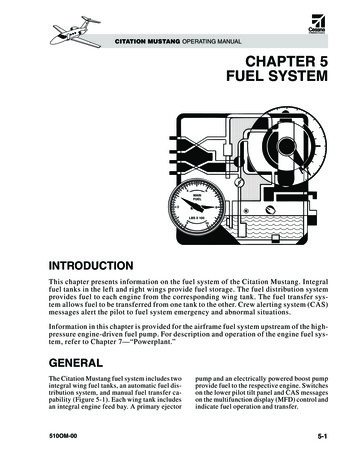
Transcription
Ending Fossil Fuel Investmentsfor the Renewable Energy TransitionLegislative Policy Research Summit on Climate ChangeNovember 18, 2014Jennie C. Stephens, Ph.D.Associate ProfessorBlittersdorf Professor of Sustainability Science and PolicyRubenstein School of Environment and Natural ResourcesCollege of Engineering and Mathematical Sciences
Climate Change & Energy: intricately linkedEnergy system change necessary for mitigation & enhancing resilienceIncreasing CO2 concentrationsEJ/yearMoving away from fossil fuels not just for climateEnergy independenceLocal economic healthCommunity empowermentPublic healthSource: mlEnvironmental and social impacts offossil fuel NuclearHydro Biomass1850 1875 1900 1925 1950 1975 2000YearHoldren, 2006Increasingglobal energydemand
Integrating Science/Engineering with Social ScienceClark Faculty in EnvironmentalScience & Policy 2005 – 2014Blittersdorf Professor ofSustainability Science & PolicyBorn and lived first in Dublin, IrelandDual US‐EU citizenshipSocial dimensionsof energy & climateMS and PhD Caltech inEnvironmental Science andEngineering (1998 and 2002)WaterSoilCarbonBA Harvard in Environmental Scienceand Public Policy (1997)WaterPost‐Doctoral Research at HarvardKennedy School 2002‐2005.PolicyEnergy: CarbonCapture & Storage
An Energy System Transition is Underwayinvolves technological and social changeinvolves both investment and divestmentIEEE Spectrum, 2014Fossil fuel basedenergy systemsRenewable basedenergy systemsChange is difficult – lock-in - multiple tensionsMoving away from fossil fuels not just for carbon & climateEnergy independenceLocal economic healthCommunity empowermentPublic healthEnvironmental impacts of fossil fuel extraction
Growing Fossil Fuel Divestment Movement
My Research:Social & Political Dimensions of Energy System Change Highlights factors beyond technical details & cost estimates Cultural influence – how individuals & communities relate totechnological changes and connect with social change? Political influence – who supports which technologies and why? How can we integrate social and technical changes? Power and influence of fossil fuel interests Research on social and political dimensions of .Wind powerSmart gridCarbon capture & storage (CCS)
Acknowledging & Broadening Energy DiscourseSPEED (Socio-Political Evaluation of Energy Deployment)A framework to assess perspectives influencing energy system changeCulturalRegulatory ntEnvironmentalEconomicStephens, JC, EJ Wilson, TR Peterson. 2008. “Socio-Political Evaluation of Energy Deployment (SPEED): An IntegratedResearch Framework Analyzing Energy Technology Deployment” Technological Forecasting and SocialChange. 75: 1224–1246Stephens, JC, EJ Wilson, TR Peterson, Smart Grid: Promoting System Innovation in Complex Multi-jurisdictional Socio-PoliticalContexts, UCLA Law Review, Volume 61, Issue 6, July 2014
Highlights of smart grid research Diversity of visions for change in electricity systems Social and cultural change as well as technical change Bifurcating perspectives on social change Some view technological change as sustaining currentenergy expectations, limiting need for social change Some envision radical social change in energyconsumption Tensions in Centralization vs. Decentralization Decentralization offers more flexibility, modularity,and adaptive capacity –also locally appropriate Multiple opportunities for broader civic engagementin energy system change Including energy education outside of engineering Energy studies could be more socially oriented,interdisciplinary and heterogeneous.Forthcoming BookCambridge University Press, 2015Foreward by Michael Dworkin
Highlights of wind research - Comparison of socio-political contextMassachusettsMinnesotaMontanaTexasHigh degree ofcontroversy & morepublic awareness despiteless wind power.Largely positiveLow public interestand engagement onwind –minimaldiscourseLargely framed as aneconomic issueFraming within cultural,health & safety, &environmental framesDensely populated state.High competition forland.Not used to seeingenergy infrastructureRisk focused ontechnicaland economic, notaesthetic orenvironmentalPositive discourseas a rural economicdevelopment tool.Communityownershipof wind turbinesstrongSparsely populated,electricity exporterLower familiaritywith wind than TXor MNMinimalconnection toclimate changeMinimal environmentalframingLittle risk discourseReflects states strongenergy-industry historyVast space - cheaperland.High familiarity &comfort with energyinfrastructureFischlein, M, J Larson, D Hall, R Chaudhry, JC Stephens, TR Peterson, EJ Wilson. 2010. Policy stakeholders and deployment of windpower in the sub-national context: a comparison of four U.S. states. Energy Policy 38: 4429–4439Fischlein, M, AM Feldpausch-Parker, TR Peterson, JC Stephens, EJ Wilson. Which way does the wind blow? Analyzing the sub‐nationalcontext for renewable energy deployment in the United States. Environmental Policy and Governance Accepted. In Press.
An Energy System Transition is Underwayinvolves technological and social changeinvolves both investment and divestmentIEEE Spectrum, 2014Fossil fuel basedenergy systemsRenewable basedenergy systemsMultiple tensions relating to .Time-frame of change – urgency?Radical vs. incremental change?Who benefits from change?Powerful entrenched interests resist changeRole of government to facilitate or accelerate change?
Tensions related to “bridging” technologiesand fuelsIEEE Spectrum, 2014Fossil fuel basedenergy systemsRenewable basedenergy systemsHow to prioritize investments during the transition? How much to invest in “bridge” technologies/fuels? Too much investment in bridge can strengthen lock-in & slow down transition Leaders in the transition recognize divesting in fossil fuels intricately linked toinvesting in renewables
Should governments invest in Carbon Capture & Storage (CCS)?Controversial set of technologies viewed by some as - absolutely essential to climate stabilization- an end-of-pipe, fossil-fuel-industry-supporting technology thatdetracts from renewables and slows transitionCO2 captureTransport(Separation andcompression)CO2 storage(including monitoringand verification) The US among the countries investing most heavily in CCS High reliance on coal & oil industry influence CCS has changed US climate and coal politics Offers solution to coal-climate dilemma The CCS community, risks and public opposition An epistemic community advocating & ignoring risks? Technological as well as political lock-inStephens, J.C., A. Hansson, Y. Liu, H. de Coninck, S. Vajjhala. 2011. Characterizing the InternationalCarbon Capture and Storage Community. Global Environmental Change. 21: 379-390IEA, 2006
Encourages complacency bycreating false sense of optimism Assumes inevitability of sustainedcoal use – perpetuates fossil‐fuels Unjustified claims of “solving”climate change Political lock‐in to continuedinvestment Distant uncertain future societalbenefitStephens, J. C. (2014). "Time to stop investing in carbon capture andstorage and reduce government subsidies of fossil-fuels." WileyInterdisciplinary Reviews: Climate Change 5: 169-173.
Studying Leaders in Energy System Transitions:Collaborating with the Helmholtz Alliance ENERGY‐TRANSVermont: Comprehensive Energy Plan State‐level commitmentGerman Energiewende (energy revolution) National‐level commitmentConcluding PointsTransitions are complicated and messy – not linear. Tensions inevitable.Divestment in fossil fuel requires supporting those whose livelihoods are challengedClimate science increases urgency for energy system change, but as entrenched actors feelmore threatened they increase resistanceTransition requires cultural shifts & mechanisms to reduce the power and influence ofcorporations in governance
Movement to broaden energy beyond engineering & economicsSovacool, B. K. (2014).Energy studies need social scienceNature 511: 529-530 Under-evaluation of social dimensions Under-representation of women & minorities Minimal integration and collaboration of social science& humanitiesFri, R. W. and M. L. Savitz (2014).Rethinking energy innovation & social scienceEnergy Research & Social Science 1(0): 183-187. Opportunities for policy-makers to engage with socialscientists in new ways to facilitate the energy systemtransition
Acknowledgements: Funding & CollaboratorsSmart Grid ProjectNSF Grant Science, Technology and Society Program (NSF‐SES 1127697)NSF RAPID Grant Science, Technology & Society (NSF‐SES 1316442)Collaborators: Tarla Rai Peterson, Elizabeth Wilson, James MeadowcroftStakeholder Engagement in Climate ModelingUSDA National Institute of Food and Agriculture 2011‐67003‐30346Collaborators: MultiplePolitics of CCS ProjectMISTRA (Swedish Foundation for Strategic Environmental Research)Collaborators: Heleen do Connick, Shalini Vaajhala, Scott JiustoWind and CCS ProjectNSF Grant Science and Society program (NSF‐SES‐0724257).Collaborators: Elizabeth Wilson, Tarla Rai PetersonPublications on websiteEmail: jennie.stephens@uvm.edyWebsite: blog.uvm.edu/jstephe1Currently recruiting graduate studentsElizabeth Wilson, U of MinnesotaTarla Rai Peterson, Texas A&M andSwedish University of Agricultural Science
Energy studies need social science Nature 511: 529-530 Under-evaluation of social dimensions Under-representation of women & minorities Minimal integration and collaboration of social science & humanities Fri, R. W. and M. L. Savitz (2014). Rethinking energy innovation & social science Energy Research & Social Science 1(0): 183-187.











